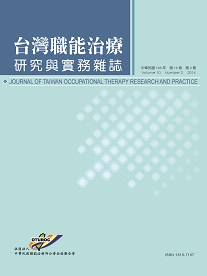Journal of Taiwan Occupational Therapy Research and Practice

半年刊,正常發行
記憶力衰退是失智症患者最常見之認知問題,影響患者日常生活獨立能力。使用具有良好心理計量特性之記憶評估工具,有助於臨床人員掌握失智症病患之記憶功能變化。本研究回顧常用於失智症病患之記憶評估工具,並評析其用於失智症病患之心理計量特性(含信度、效度及反應性)。方法:研究者合併檢索中、英文之電子期刊資料庫中近六年間(2014 年 1 月至 2019 年 10 月)常用於失智症患者實證研究之記憶評估量表。結果:顯示常用於失智症病患實證研究之記憶評估工具共計4項:瑞氏聽力詞語學習測試(Rey Auditory-Verbal Learning Test)、自由和線索選擇性回憶測驗 (Free and Cued Selective Reminding Test)、魏氏記憶量表 (Wechsler Memory Scales)、阿茲海默症評估測驗 - 認知 (Alzheimer’s Disease Assessment Scale-Cognitive subscale)。結論:研究結果顯示應用於已確診失智症患者,僅阿茲海默症評估測驗 - 認知有較充分的信度、效度和反應性驗證,其它 3 項評估工具心理計量特性尚未臻完備,特別是反應性。建議未來研究針對此些記憶評估工具須進行更加全面之心理計量特性驗證,以提供臨床和研究人員實證依據。
Objective: Memory deficit is one of common cognitive problems in patients with dementia, affecting patients’ independent of performing activities of daily living. Selecting and using memory measures with good psychometric properties and feasibilities is important to identify the memory problems. This study were to review memory measures that were frequently used in patients with dementia and appraise their psychometric properties (i.e., reliability, validity, and responsiveness). Methods: We searched empirical studies of dementia published from January 2014 to October 2019. Results: The results showed that four frequently used memory measures were Rey Auditory-Verbal Learning Test, Free and Cued Selective Reminding Test, Wechsler Memory Scales, and the Alzheimer’s Disease Assessment Scale-Cognitive subscale. Conclusions: The Alzheimer’s Disease Assessment Scale-Cognitive subscale has been examined reliability, validity, responsiveness in the patients with dementia. The psychometric properties of other three measures were not examined comprehensively, especially responsiveness. Future studies are recommended to evaluate psychometric properties of these memory measures in the patients with dementia in order to provide empirical evidence for clinicians and researchers.












